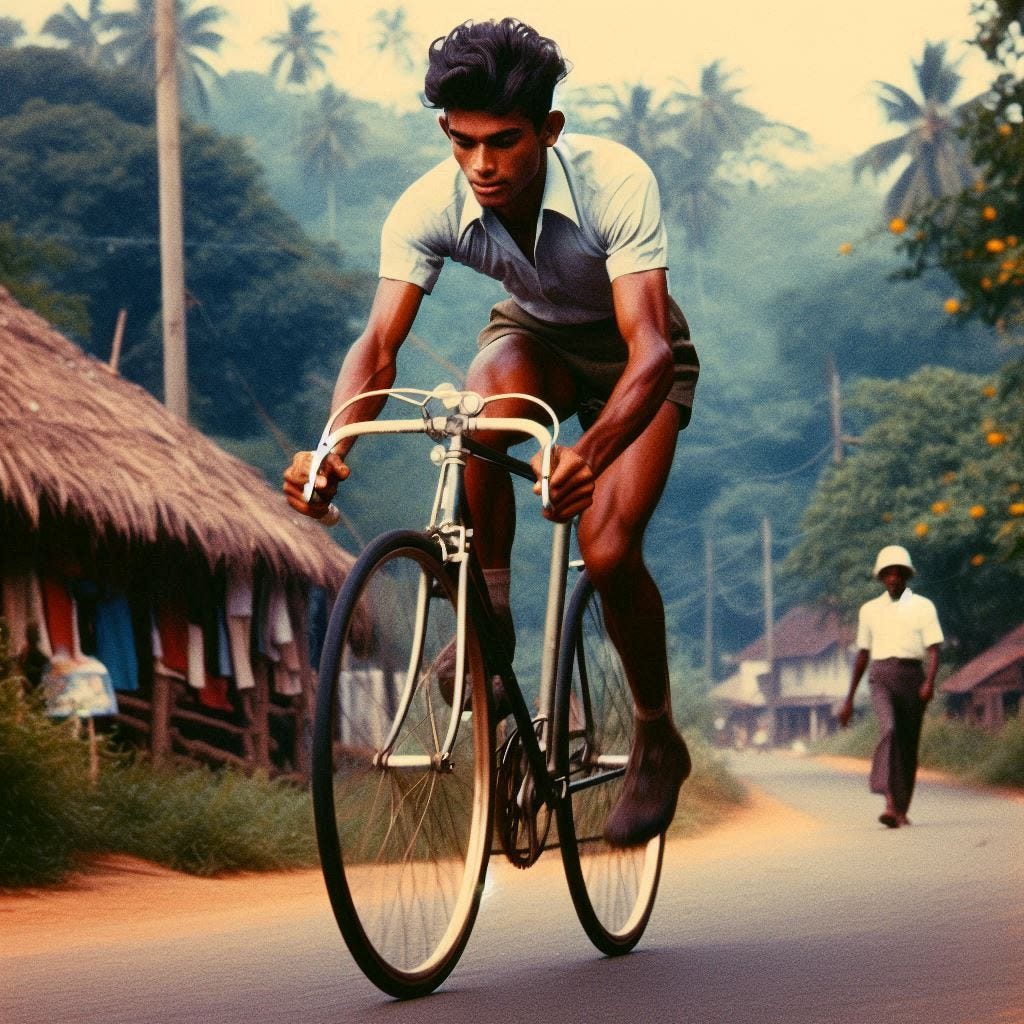When Fate Pedalled In Dalugama
When Fate Pedalled In Dalugama
Collision at the Crossroads
“When Fate Pedalled In Dalugama. Collision at the Crossroads” by Denzil Jayasinghe recounts a tragic accident where a young cyclist was struck by a vehicle in 1973. The story, told from the perspective of a witness, describes the chaotic scene, the boy’s struggle for life, and the compassionate act of a stranger who takes him to the hospital. Through vivid imagery and emotional language, the author reflects on the fragility of life and the unexpected turns of fate. The excerpt also provides glimpses into other stories written by Jayasinghe, showcasing his diverse range of topics, from personal anecdotes about his father and brother to reflections on Sri Lankan culture and societal issues.
The sun, a weary traveller, descended upon Lumbini Mawatha, bathing the world in a sad amber glow. Shadows stretched like memories across the bustling junction, where life pulsed with the erratic heartbeat of a city caught between tradition and modernity. The cacophony of horns and the occasional chime of bicycle bells formed a discordant symphony, the soundtrack of urban Ceylon.
From the slope of Mumbini Mawatha, a young cyclist emerged, his face alight with the reckless joy of youth. He wove through the tapestry of vehicles with the confidence of one who believes himself invincible, unaware that fate was about to unravel the threads of his existence.
Everything changed instantly, in a flash. The boy’s turn onto Kandy-Colombo Road was not merely reckless an invitation to tragedy. The screech of metal against metal rents the air, followed by a thud that seemed to silence the very breath of the city. Where once there was exuberance, now lay a crumpled form, a broken puppet whose strings had been cruelly severed by circumstance.
I stood, rooted to the spot, as if the gods had turned me to stone. Vijitha’s fingers dug into my arm, his grip a painful reminder that this was no nightmare from which I could awake. The perpetrator of this crime had fled, leaving behind a wake of questions that hung in the air like monsoon humidity.
The boy stirred each movement an exercise in agony. Blood — that most vital essence — seeped from his head and mouth, staining the indifferent asphalt. His attempts to rise were pitiful, a cruel mockery of the vigour that had propelled him moments before.
Hovering between worlds, the lad’s consciousness flickered like a candle in the wind. With each ragged breath, he seemed to grasp at the fragments of his former self, only to have them slip away like grains of sand through an hourglass. His eyes, once bright with life, now darted about unseeing as if searching for an escape from this sudden, harsh reality.
In a moment of what could only be described as misguided hope, he attempted to stand. His body, no longer the obedient servant of his will, shook with the effort. Limbs that had so recently carried him quickly now betrayed him, refusing the most straightforward commands. He managed only to prop himself up on one elbow, a Pyrrhic victory against the unyielding road that had become his unwelcome resting place.
But the gods were not yet satisfied with their sport. As swiftly as it had come, the boy’s strength deserted him. He collapsed once more, a puppet whose strings had been abruptly cut, eliciting a collective gasp from the onlookers who had gathered like vultures at the scene of misfortune.
There he lay, cheek pressed against the gritty surface, a poignant reminder of life’s fragility. Blood and dust mingled, creating a gruesome artwork that spoke volumes of the thin line between the mundane and the tragic.
Voices rose around us, a chorus of concern and outrage. “Aiyo, poor boy,” someone murmured, their words carried on the warm evening breeze. The air thickened with tension as if the atmosphere could no longer bear the weight of our collective anguish.
Then, like a ray of light piercing through storm clouds, a stranger stepped forward. This Good Samaritan, his face etched with determination, offered to rush the fallen cyclist to the hospital. At that moment, it was as if the entire city exhaled, reminded that even in our darkest hours, the flame of human compassion can never be fully extinguished.
As the makeshift ambulance — an ordinary vehicle elevated to noble purpose by the kindness of its owner and the cruel whims of fate — disappeared into the gathering dusk, I stood rooted to the spot, suddenly aware of life’s fragile equilibrium. The sun, that silent witness to our mortal dramas, finally relinquished its hold on the day, slipping below the horizon with a reluctance mirrored my own. Yet I knew, with a certainty that settled in my bones like the coming night, that this day’s events would persist in memory long after the last glimmer of twilight had been swallowed by darkness. The image of the fallen cyclist, the stranger’s unexpected benevolence, the collective breath of a city suspended between tragedy and hope — these would remain etched in my mind, a stark reminder of how swiftly the ordinary can transform into the extraordinary and how thin the line between joy and sorrow truly is.

Comments
Post a Comment